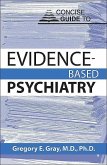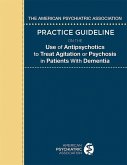The use of evidence-based guidelines and algorithms is widely encouraged in modern psychiatric settings, yet many practitioners find it challenging to apply and incorporate the latest evidence-based psychosocial and biological interventions. Now, practitioners have an outstanding new resource at their fingertips. How to Practice Evidence-Based Psychiatry: Basic Principles and Case Studies accomplishes two goals: it explains the methods and philosophy of evidence-based psychiatry, and it describes ways in which psychiatrists and other mental health specialists can incorporate evidence-based psychiatry into their clinical practices. Uniquely relevant to psychiatric clinicians, this is the only book on evidence-based medicine specific to the field of psychiatry that addresses integrated psychopharmacology and psychotherapies.
This new book first provides an expansion on the popular text the Concise Guide to Evidence-Based Psychiatry, updating the sections on clinical trials, the teaching of evidence-based medicine, and the effective treatment of patients with complex comorbid conditions. It then allows experts from a variety of specialty areas and practice settings to describe how they incorporate the latest evidence and outcome studies into interesting and inspiring cases of their own.
The book starts with the assumption that clinicians must adapt guidelines, algorithms, other sources of evidence, and the interpretation of this evidence to each individual patient. It describes basic statistical concepts in an easily understood format and offers separate chapters devoted to systematic reviews and meta-analyses, clinical practice guidelines, diagnostic tests, surveys of disease frequency, and prognosis and psychometric measurement. It also presents an easily relatable discussion of many of the major issues of evidence-based psychiatry, such as use of the "Five-Step" evidence-based medicine model. ¿ The first section can be used both as an introduction to the topic and a ready reference for researching the literature and appraising evidence.¿ The second section includes relevant case examples of major psychiatric disorders, and the third presents case examples from diverse treatment settings. In these sections, 24 contributing clinicians from a variety of practice settings discuss situations in which they followed aspects of evidence-based care. ¿ The text includes tables and charts throughout the text, including algorithms, guidelines, and examples of simple, therapist-devised measures of progress, further enhance learning, retention, and clinical practice.
How to Practice Evidence-Based Psychiatry: Basic Principles and Case Studies is a valuable new tool that will help residents, practicing psychiatrists, and other mental health workers find the most useful and relevant information to inform and improve their everyday practices.
This new book first provides an expansion on the popular text the Concise Guide to Evidence-Based Psychiatry, updating the sections on clinical trials, the teaching of evidence-based medicine, and the effective treatment of patients with complex comorbid conditions. It then allows experts from a variety of specialty areas and practice settings to describe how they incorporate the latest evidence and outcome studies into interesting and inspiring cases of their own.
The book starts with the assumption that clinicians must adapt guidelines, algorithms, other sources of evidence, and the interpretation of this evidence to each individual patient. It describes basic statistical concepts in an easily understood format and offers separate chapters devoted to systematic reviews and meta-analyses, clinical practice guidelines, diagnostic tests, surveys of disease frequency, and prognosis and psychometric measurement. It also presents an easily relatable discussion of many of the major issues of evidence-based psychiatry, such as use of the "Five-Step" evidence-based medicine model. ¿ The first section can be used both as an introduction to the topic and a ready reference for researching the literature and appraising evidence.¿ The second section includes relevant case examples of major psychiatric disorders, and the third presents case examples from diverse treatment settings. In these sections, 24 contributing clinicians from a variety of practice settings discuss situations in which they followed aspects of evidence-based care. ¿ The text includes tables and charts throughout the text, including algorithms, guidelines, and examples of simple, therapist-devised measures of progress, further enhance learning, retention, and clinical practice.
How to Practice Evidence-Based Psychiatry: Basic Principles and Case Studies is a valuable new tool that will help residents, practicing psychiatrists, and other mental health workers find the most useful and relevant information to inform and improve their everyday practices.
Dieser Download kann aus rechtlichen Gründen nur mit Rechnungsadresse in A, D ausgeliefert werden.









